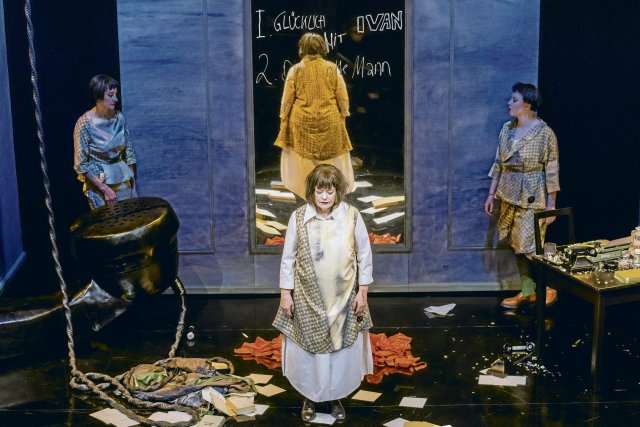Sad trio on the battlefield of their own apartment: Constanze Becker, Josefin Platt and Maeve Metelka.
Photo: @ Joerg Brueggemann / OSTKREUZ
It starts with a scribbling, a scratching. Three women, whose dachshund hairstyles, 1960s German teacher costumes and reading glasses look as strained as their writing hands, are working with pens on five large, stationary blocks. The three actresses who are here, Constanze Becker, Maeve Metelka and Josefin Platt, costumed by Elena Scheicher, are not disturbed by the audience coming in – this scribbling of unreadable sentences is not communication, but a vain attempt to write their way out of a hopeless situation .
This is how Fritzi Wartenberg’s production “Malina” begins at the Berliner Ensemble based on the novel of the same name by Ingeborg Bachmann, which premiered last Wednesday. Bachmann called the novel “explicitly an autobiography, but not in the traditional sense. A spiritual, imaginary autobiography«. Bringing the book into stage form is a demanding task. How the writing process can be translated into actions, the disembodied into the body, and the unspeakable horror into outright horror can be successfully demonstrated by the clever choice of having the three actresses all play the female “I” of the novel and at the same time another male role. This makes what sounds paradoxical possible: for a conversation to happen and not happen at the same time.
The main characters in Bachmann’s novel are two men, Ivan and Malina, and an “I” who is not a classic narrator, but writes directly from a moment, a “today.” Subordinate to both men, “I” cannot do without either of them. Ivan (mostly played by Maeve Metelka) works in an “institute for extremely necessary matters”, has little time and, by his own admission, loves no one. He decides when he comes and goes and what Ivan and “I” do together: mostly playing chess, which also means playing war. In Wartenberg’s production, Constanze Becker, conducted by Ivan, contorts herself into poses of sexual submission over a chessboard made of pieces of paper – or are they kitchen tiles? When Ivan is not visiting, “I” and Ivan are connected by telephone. In the center of the stage set (Janina Kuhlmann) there is a perverted giant telephone, on, on and under which the person being called struggles. She holds on to the black telephone line like an umbilical cord, which could soon be wrapped around her neck.
The second man, Malina (mostly played by Josefin Platt), initially seems to be part of the apartment’s inventory rather than the staff. On the stage he sits or stands somewhere like the table with the typewriter, the ashtrays and the whiskey, not idle, however, but listening in when a telephone call is being made and taking notes when a letter is being written.
Over time it becomes clear that the body, the apartment that Ivan visits and changes, has actually always been Malina’s apartment. She ends the life that is not hers by literally disappearing into the wall of the Vienna apartment at Ungargasse 6. When Ivan calls for the last time in the last scene, Josefin Platt as Malina answers the phone and explains that no woman has ever lived in this apartment.
Wartenberg’s production, like the novel, never leaves the apartment. Time stands still, as it does in all of Austria, where no one is working on a future, but rather “getting rid of the past completely” (Bachmann). Because nothing changes, the transition between boredom and horror is just a lighting adjustment – the room remains the same when the killing begins again.
The performance is classic spoken theater with a multitude of voices that support each other, overlap each other, and interject. With pathos, Becker inflates her voice until it bursts, Metelka knows how a Viennese articulates the word “disgusting,” and Platt expresses the timeless horror in an old and at the same time childlike voice.
The production is too precise to become sentimental. At one point, a moment of euphoria arises as the first-person writer, in the increasingly bright light, lists which books she has read, when, where and how, culminating in the memory of reading Lenin, completely drunk, and the joy of reading newspapers and notes since childhood.
The step into the wall on which Bachmann’s “I” scratched is not a step into the future. What has not disappeared is their testimony that there could be another world outside these walls.
Next performances: April 8th, 9th and 10th
Become a member of the nd.Genossenschaft!

Since January 1, 2022, the »nd« will be published as an independent left-wing newspaper owned by the staff and readers. Be there and support media diversity and visible left-wing positions as a cooperative member. Fill out the membership application now.
More information on www.dasnd.de/genossenschaft
judi bola judi bola sbobet88 link sbobet
